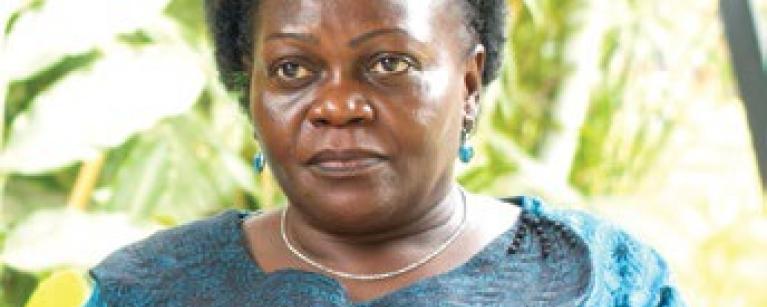I have been a Member of Parliament since 2011. I’m also the Chairperson of the Uganda Women’s Parliamentary Association. This is an association that brings together Members of Parliament, including male members who believe in the women’s agenda.
We have been working with Oxfam’s partner Uganda Women’s Network (UWONET) which has mentorship and capacity-building programmes for MPs. They also support us with some legislative processes, such as private member’s bill.
Women face a lot of challenges, ranging from violence in their households, to various economic disadvantages. Women do not own land and women who want to do business but cannot do it without collateral, so it becomes a bit of a challenge accessing loans from the banks.
Parliament has pushed for legislation to end violence, mainly against women and girls. We have in place the Domestic Violence Act, with penalties against those who violate the rights of others, specifically the women in the home.
Domestic violence has drastically reduced in certain communities as a result. Women now know the law exists to protect them and they know where to report. If you go to the police stations countrywide, you will find reports of domestic violence. That to me is a plus.
“We have also tackled other social norms such as genital mutilation. It has negative effects on the health of the women. Therefore, Parliament enacted the “Prohibition of Female Genital Mutilation Act” that prohibits the mutilation of women. It has drastically helped reduce this vice against women, and we continue to speak to them. ”
In regions such as Sebei and Karamoja where it is practised, the Government has set up boarding facilities that help to keep the girls away from the communities. Annually the government also marks the anti-FGM day and uses the day to further enlighten the people on the dangers of female genital mutilation.
We also have the Anti-Trafficking Persons Act, because trafficking is real, the most vulnerable being mainly girls and young women. There are other legislations that we have worked on, i.e. The Market Act, of 2023. Close to 75% of the people in the markets are women.
We want to ensure that as they come to the market, they have a safe place, to breastfeed their babies or even just a play area for their children as they work. It is all intended to economically empower the women, because if you don’t have time to do business then you will remain in poverty. We want women to work and take care of their children.
We also have the Marriage Bill. The act that exists was left by the colonial masters in 1905 and is no longer relevant. Most of the provisions have been outlawed, or even overtaken by events. So, we should have a bill that regulates marriages. It will go a long way in resolving some of the challenges faced especially at the community level.
Unfortunately, 65% of the women in long term relationships in this country think they are married legally when they are not, they 20 are cohabiting. This Bill will go a long way in defining their rights.
The succession Amendment Act has gone a long way, in resolving some of the challenges that the widows in Uganda have been facing. Their family members were chasing them away from the home after the passing of their husbands, but with this law in place, this will not happen. All biological children are also properly catered for, not only those produced in wedlock.
We are aware of the economic challenges that women are facing and it is partially due to our social norms. Because of this, women have come out and are trying to engage in business so that they can support their husbands and their families. We also have many single and widowed mothers.
The government tried putting in place programmes like the Uganda Women’s Entrepreneurship Programme where women could apply for credit. Unfortunately, it was so meagre that the impact of that funding was not felt at the grassroots level. For that reason, we came up with the Parish Development Model, this takes money closer to the women. We hope the women will access credit and buy their own property.
“Politics previously was the preserve of men and very few women were involved, even as we speak, 33% of women constitute the numbers in the Parliament of Uganda, but even if you look at these that contest for the direct seats, we only have 14 women out of the 296 or more constituencies”
Most women have gone into politics, partly because of the various programmes. The civil society, the NGOs, the government itself, is encouraging women to join politics.
The level of women’s education has improved. Previously, the girl child was the most disadvantaged, however, we need to appreciate government for Universal Primary and Secondary Education because now the literacy rate has gone up by about 71%, even amongst the women. So, with the improved level of literacy coupled with sensitization and various radio programmes in the district, women have woken up and taken an interest in politics.
“Let’s get away from this 30% positions reserved for women when it comes to constituting boards. Women are educated, women can do whatmen can do. We want to see more women in the boardroom and in decision-making positions.”
We hope to see more women vying for other political offices such as the presidency, Hopefully, when President Museveni retires a woman will be elected as the first female president of Uganda and the majority of the women will be out of poverty.
I want to thank Oxfam, through UWONET for the support that it has given us as the Parliament of Uganda. We hope that Oxfam can find more resources to complement government efforts in eradicating poverty in this country.
